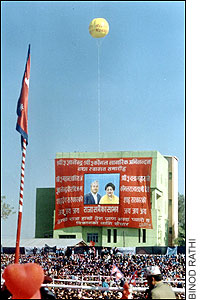 A mid the political turmoil of the last three months, each force has been busy asserting how the good of the people is its overriding concern. The palace professes that the monarchy and democracy are committed to ensuring a prosperous future for all Nepalis. The mainstream parties insist they are wedded to preserving the gains of the people's movement of 1990.
A mid the political turmoil of the last three months, each force has been busy asserting how the good of the people is its overriding concern. The palace professes that the monarchy and democracy are committed to ensuring a prosperous future for all Nepalis. The mainstream parties insist they are wedded to preserving the gains of the people's movement of 1990. The Maoists affirm they want to develop a new model of democracy in which the people's right to dissent and rebel in an organised form would be institutionalised.
If everyone is so steadfastly on our side, why do we feel so abandoned? Perhaps we're not really sure of who we are and what we want. The triad of liberty, equality and fraternity was trendy enough as a slogan for the French revolutionaries and their immediate adherents. In an era that prizes 20-second sound bites and instant remedies, leaders have a hard time catching up with followers. You can't expect creativity and quickness to flow comfortably from careerists languishing in low morale.
Let's try to probe the malaise from the politicians' perspective. The Koirala family's claim that nearly two dozen members of the clan were either jailed or exiled during Nepal's two campaigns for democracy doesn't entitle them to any special treatment. Nor does the UML leaders' insistence that they are prepared to enter Nakkhu Jail every time they exit Singha Durbar. Their plea for some public empathy is fair, though. How many people on the extreme right and left, after all, are prepared to serve prison time for their political beliefs? (Which, if you ask me, sounds a lot harder than to kill or die for them.)
Someone said the reason there are so few female politicians is that it is too much trouble to be two-faced. Behind this slimy facade, however, are people who have convictions. A lot of politicians have done their own thinking and some blame the people for our plight. This sweeping indictment may sound harsh, but is not entirely unfounded. Candidates who have a hard time believing what they say during elections can only be flustered by the way constituents take them at face value. How fair is it, moreover, for voters who can't remould themselves to expect their leaders to be entirely to their liking?
With democracy once again on trial the world over, speaking disrespectfully of the political class has acquired a new appeal. In the post-9/11 environment, we no longer have the luxury of saying that only those who can't join the club are its most vocal critics.
Granted, there is much to complain about. Governments resting on the consent of the governed are supposed to be more immune from revolutionary disturbances than those in which the people have no right of participation. Nepal has failed the test.
In terms of accomplishing the primary tasks for which they were elected, the post-1990 leadership has fared miserably. The discord, depravity and destitution threatening us today, however, have existed for ages. They have come to the surface now because the carpet they used be swept under was discarded 12 years ago. When Chiranjibi Wagle, Khum Bahadur Khadka and Jaya Prakash Prasad Gupta became the first targets of the stringent anti-corruption laws they shepherded through parliament, the radiance of democracy transcends its intrinsic excellence.
Considering the social and civic effects the post-1990 political class has produced among those it has governed, we may have little reason for despair. The political enfranchisement of the masses has had an invigorating impact on our collective consciousness.
The fact that 73 percent of Nepalis recently surveyed in six Maoist-affected districts by the Centre for Economic and Social Development stood in favour of multiparty democracy is hardly surprising. The real news is that more people said they preferred a partyless system (11 percent) to one-party communist rule (nine percent). Those old enough to recall how a few Kangresis and comrades managed to get into the Rastriya Panchayat through the graduates' constituency and adult-franchise balloting can perhaps grasp better the substance of that sentiment.
In the end, democracy is what the people think it is and will remain that way. One way of bridging the gap between idealism and realism may be for politicians to raise their efficiency and the people to lower their expectations.


